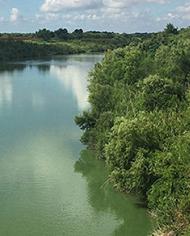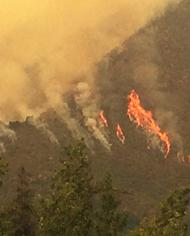Healthy rangelands are essential for ensuring grazing and forage productivity, reducing wind erosion and wildfire risks, and supporting wildlife ecosystems.
Tellus Articles
ARS scientists develop monitoring system to support farmers in their effort to protect the Chesapeake Bay
Aquaponic systems may help sweetpotato industry and feed ‘urban deserts.’
ARS researchers in Boise, ID, are studying prescribed fires in western juniper type landscapes to better understand how this land management tool affects the hydrology, habitat, and overall ecosystem of this land type.
ARS researchers are studying the potential benefits of reversing soil erosion on hilly lands
Understanding what can affect genes may lead to more potent vaccines
Disposable Consumer Products May Sprout Antimicrobial Resistance
More greenhouse gas comes from water than land.
Scientists are investigating how farmer can maximize profitability with limited water.
Scientists work to define how agriculture affects greenhouse gasses and more
ARS project begins to refill water source beneath Mississippi Delta.
Researchers use long-term data to assess organic practices.
Study shows that the old rule of thumb may not apply to all situations.
Growing switchgrass in non-irrigated pivot corners may help make farmers’ ends meet
ARS works with foreign scientists to prevent overseas diseases from spreading to the United States.
Researchers search for solutions to a deadly livestock virus that hides in plain sight.
Researchers train the next generation for the science of upheaval.
Like ‘mad cow,’ chronic wasting disease in deer currently has no cure.
See how ARS researchers are using insects to reduce the presence of Arundo, a fast-growing invasive grass.
A site in the middle of Missouri provides critical agricultural research on the national scale.
ARS researchers are downscaling climate data to improve modeling techniques.
ARS researchers are working on improving fish fillet quality.
ARS researchers look to improve diagnosis, testing, and vaccines for leptospirosis.
A new workshop unites practice with research on the beneficial effects of fire.
New uses for leftover agricultural products promise more revenue and less waste.
Before you know it, you might be fueling your car from a tree or bale of hay.
Advanced research and technology could squeeze every drop from feedstocks.
Research and commerce use a two-pronged ‘fork’ approach to deal with invasive fish
Small herbivores consider restoration seedlings a delicacy.
No cure yet, but treatment options for devastating ailment may be on the way.
Scientists are using a special camera to look into the eyes of each cow being processed through a feedlot.
Scientists discover new variant of bacteria that causes pinkeye.
ARS researchers are working on eradicating the cattle fever tick.
ARS researchers look to improve diagnostics tests and vaccines for this devastating disease.
Alligator weed works its way into Northern California. ARS researchers are seeking biocontrol agents.
New online tool helps California farmers reduce the risks of climate change.
ARS researchers are working on strategies to protect herds from transmission of brucellosis.
ARS scientists explain how farmers can use nitrogen while both saving money and protecting the planet.
Dr. Pugh made major advances in understanding the role of the bacterium that can cause pinkeye in cattle.
Assessing whether mycotoxins in poultry feed could predispose chickens to fatal disease even at low levels.
ARS researchers are developing ecofriendly practices for Atlantic salmon production.
ARS is pioneering a way to move water through a technology known as Managed Aquifer Recharge.
Using cutting-edge genomics to bring healthier, stronger fish to the aquaculture industry and your plate.
ARS is partnering with the commercial aquaculture industry to produce the salmon of the future.
ARS researchers use coconut to create longest-lasting natural insect repellent.
ARS scientists identified a source of contamination in Kewaunee County, WI, groundwater.
Scientists found that feeding steam-flaked corn to cattle significantly reduced enteric methane emissions.




















































